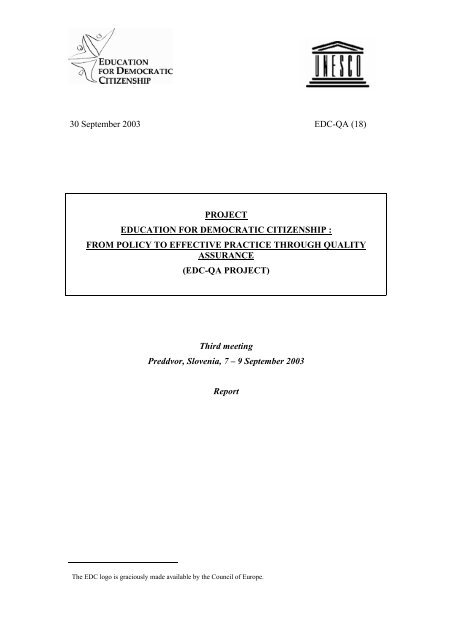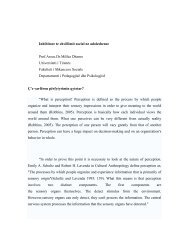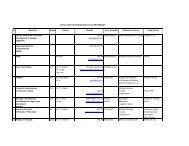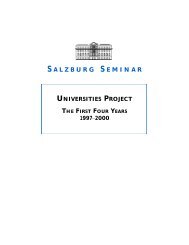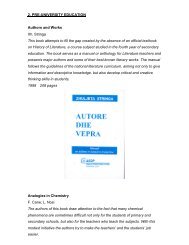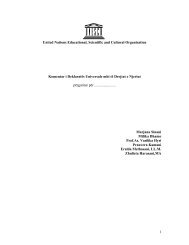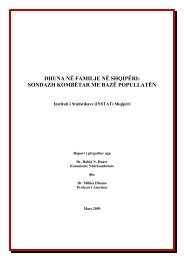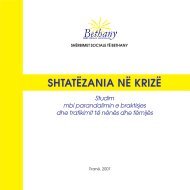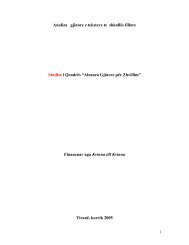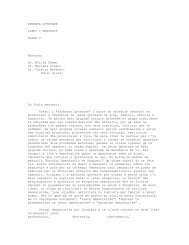FROM POLICY TO EFFECTIVE PRACTICE ... - Milika Dhamo
FROM POLICY TO EFFECTIVE PRACTICE ... - Milika Dhamo
FROM POLICY TO EFFECTIVE PRACTICE ... - Milika Dhamo
Create successful ePaper yourself
Turn your PDF publications into a flip-book with our unique Google optimized e-Paper software.
<br />
<br />
<strong>FROM</strong> <strong>POLICY</strong> <strong>TO</strong> <strong>EFFECTIVE</strong> <strong>PRACTICE</strong> THROUGH QUALITY ASSURANCE<br />
<br />
30 September 2003 EDC-QA (18)<br />
PROJECT<br />
EDUCATION FOR DEMOCRATIC CITIZENSHIP :<br />
<strong>FROM</strong> <strong>POLICY</strong> <strong>TO</strong> <strong>EFFECTIVE</strong> <strong>PRACTICE</strong> THROUGH QUALITY<br />
ASSURANCE<br />
(EDC-QA PROJECT)<br />
Third meeting<br />
Preddvor, Slovenia, 7 – 9 September 2003<br />
Report<br />
The EDC logo is graciously made available by the Council of Europe.
2<br />
INTRODUCTION<br />
The third meeting of the project “Education for democratic citizenship : from policy<br />
to effective practice through quality assurance (EDC-QA project)” took place in<br />
Preddvor, Slovenia on 7-9 September 2003. It was an extended meeting as it included<br />
all the researchers who prepared the national reports on quality assurance in education<br />
in their country 1 , experts from Sweden and England and a representative from the<br />
Standing International Conference of Inspectorates (SICI). The meeting was<br />
moderated by Michela Cecchini. The proposed programme, which was slightly<br />
adapted as the meeting proceeded, and the list of participants appear respectively in<br />
appendix 1 and 2.<br />
The meeting objectives were to :<br />
- continue to build up knowledge on QA in education and QA for EDC in SEE<br />
specifically and in Europe in general<br />
- exchange views on the context, needs and possibilities for EDC QA in SEE<br />
- develop a common understanding and framework for the preparation of the<br />
instrument for the quality assurance system for EDC (eg. objectives, structure,<br />
contents, preparation method(s) and calendar)<br />
Working methods included presentations and plenary discussions of the results of the<br />
stocktaking of QA in SEE and the international review of QA models; presentation<br />
and plenary discussions of case studies (Sweden and UK); working group discussions<br />
At the meeting,<br />
- An evaluation of the research process (preparation of national reports on QA<br />
in SEE countries) took place;<br />
- The initial findings of the stocktaking reports (regional analysis of national<br />
reports on quality assurance in the SEE countries) were presented and<br />
discussed, allowing for a clearer understanding of the current situation,<br />
potentials and obstacles in relation to quality assurance in education in SEE;<br />
- The initial findings of the international review of QA models and case-studies<br />
from QA systems in Sweden; Scotland, UK; England and Wales, UK;<br />
Slovenia were presented and discussed, allowing for a clearer understanding of<br />
challenges and issues for preparing EDC specific quality assurance systems;<br />
- An outline of the QA tool kits for EDC was agreed upon, including their<br />
objectives, contents and structure;<br />
- A review of the nomination process of EDC-QA focal points in each country<br />
was carried out and country-specific strategies were developed where<br />
necessary;<br />
- The follow-up to the national reports and the regional analysis was agreed<br />
upon, including discussions in each country between the researchers and<br />
responsible persons in the education ministries; translations and publication in<br />
paper and electronic forms;<br />
- The next steps for the preparation of the QA tool kits for EDC were agreed<br />
upon;<br />
1 Albania, Bulgaria, Croatia, Kosovo, Macedonia, Montenegro, Romania, Serbia, Slovenia
3<br />
- A concluding round on the meeting and on the prospects for the overall project<br />
took place.<br />
This meeting report presents the main findings thematically rather than<br />
chronologically. Where appropriate, discussion results are outlined in detail in an<br />
appendix.<br />
I. EVALUATION OF THE S<strong>TO</strong>CKTAKING PROCESS<br />
An evaluative discussion of the stocktaking process – production of national reports<br />
on quality assurance in education in SEE – took place at the beginning of the meeting,<br />
for two reasons. The discussion was moderated by Bernd Baumgartl.<br />
Firstly the Preddvor meeting corresponded to the conclusion of the stocktaking phase,<br />
particularly with the presentation of the initial findings of the regional analysis. In<br />
order to ensure the coherence with the objectives of the EDC-QA project, it was<br />
agreed at the first meeting of the project core group 2 to carry out an on-going<br />
evaluation, in other words to provide for quality assurance of the EDC-QA project as<br />
a whole.<br />
Secondly the evaluation is also to be formative, i.e. comments on the first project<br />
tasks would inform the planning of the next tasks to be discussed at the Preddvor<br />
meeting.<br />
The main results of the evaluative discussion are presented in appendix 3.<br />
II.<br />
RESULTS OF S<strong>TO</strong>CKTAKING : NATIONAL REPORTS AND<br />
REGIONAL ANALYSIS<br />
The objective of the stocktaking exercise was to provide a picture of the situation in<br />
each individual country and regionally of quality assurance in education.<br />
In general it appears that quality assurance elements exist in different forms in<br />
different countries. Secondly, given the current situation of quality assurance of<br />
education in Southeast Europe, no system from other countries can be applied : a<br />
specific QA system for SEE needs to be developed.<br />
The initial findings of the regional analysis presented by Cameron Harrison,<br />
particularly obstacles and assets for carrying out quality assurance in education and<br />
for EDC in Southeast Europe, are set out in appendix 4.<br />
The ensuing discussion particularly highlighted that<br />
- while EDC appears as a priority in policy formulations, EDC is not embedded<br />
in school practice<br />
- while a number of countries are developing quality assurance policies, this is<br />
not shared across the region. Furthermore self-evaluation and quality<br />
2 meeting held in Ljubljana in February 2003, cf. report, document EDC-QA(4)
4<br />
assurance are far from being embedded in school practice, partly due to a<br />
centralised education system and little devolution of responsibilities<br />
- the teaching culture appears in certain countries to be based on double<br />
standards : the standards defined at policy level and those of day to day<br />
practice. There seems to be a need for bringing the two standards closer<br />
together in terms of professional standards<br />
- difficult working conditions (e.g. salaries, equipment, etc) tend to dominate<br />
discussions on quality in education<br />
- empowering teachers for change, i.e. raising their awareness and motivating<br />
them for change appears to be a key issue and a first step in introducing<br />
quality assurance processes.<br />
III.<br />
QUALITY ASSURANCE MODELS : ISSUES AND CHALLENGES<br />
The key objective of the Preddvor meeting was to lay the foundations for carrying out<br />
the next task of the EDC-QA project : the preparation of a quality assurance<br />
instrument specific for EDC.<br />
Several plenary presentations of quality assurance models contributed to identifying<br />
essential issues and challenges and to building up the understanding of quality<br />
assurance in education in general and specifically for EDC. These were the<br />
presentation of :<br />
- the Scottish and Slovenian models, by Janez Krek<br />
- the Swedish indicators instrument BRUK 3 , by Maria de Age<br />
- quality assurance indicators and mechanisms for citizenship education in<br />
England and Wales, by Liz Craft<br />
- the findings of the international review of QA models by Janez Krek<br />
Key issues and challenges, which emerged from the presentations, are presented<br />
thematically. They will need to be taken into account in the next steps of the project<br />
activities.<br />
Constitutive elements of quality assurance<br />
- Strategies for quality assurance include a number of elements :<br />
a) e.g. in Slovenia : in-service teacher training; school inspection,<br />
external assessment of knowledge; school leadership; self evaluation,<br />
b) e.g. in England and Wales : local EDC advisors, monitoring provision,<br />
inspection, research, assessment, support networks;<br />
- It is necessary to set up all elements of a QA system and the relationship<br />
between them;<br />
3<br />
BRUK stands for Bedömming, Reflektion, Utveckling, Kvalitet : assessment, reflection,<br />
development, quality
5<br />
- It is necessary to determine and agree on what is meant by standards and by<br />
indicators : standards may be understood as part of the curriculum and answer<br />
the question what; indicators are necessarily part of an evaluative instrument<br />
and answer the question how;<br />
- Indicators need to be differentiated from statistics. Indicators are a tool for<br />
school development. The purpose of a system of quality indicators is to<br />
increase the quality of childcare and education (Sweden);<br />
- The benefits of the BRUK system of indicators in Sweden are<br />
a) For schools and teachers : starting point of discussions on quality,<br />
b) For inspection : a common quality language exists; schools are<br />
prepared for inspection,<br />
c) For both schools and inspection : it is easier to focus on a specific<br />
characteristic;<br />
- Self-evaluation corresponds to addressing the questions: how are we doing,<br />
how do we know, what are we going to do now (c.f. How good is our school,<br />
Scotland). Self-evaluation is a means for quality assurance. Self-evaluation is<br />
not the final goal (Slovenia). Knowledge of how things should be and of how<br />
things are leads to development (Sweden);<br />
- that members of school staff should be themselves responsible for designing<br />
and conducting their own self-evaluation is crucial for establishing a<br />
philosophy of accountability;<br />
An instrument on EDC<br />
- There shouldn’t be any major difficulty to define EDC conceptually : EDC<br />
concepts seem to be shared, most approaches overlap in spite of a few<br />
specificities;<br />
- The evaluation instrument to be prepared needs to makes sense to schools. A<br />
holistic perspective of EDC should be adopted and include not only concepts<br />
but also school activities and the working of the school, as well as the<br />
dimensions of knowing, feeling, doing;<br />
- All contemporary (post reform) curricula have in common that they include<br />
references to knowledge, values, skills;<br />
- Can EDC standards and indicators be defined at the level of the SEE region <br />
yes, this is possible and desirable. The goal of developing a set of generic<br />
indicators should be to serve as an example. They can also help to compare<br />
instruments that will be – or already are – developed in particular countries;<br />
Instrument development strategies<br />
- It is necessary to ensure a democratic process for the preparation of the<br />
instrument;
6<br />
- Self-evaluation and quality assurance must be given a place in the system. A<br />
QA system specific for EDC has to fit into existing QA institutional structures.<br />
When designing national models for quality assurance in EDC, there should be<br />
an investigation and analysis of the whole education system;<br />
- EDC should become part of self-evaluation projects where they exist (e.g. in<br />
Slovenia);<br />
- The EDC QA instrument can be structured around key areas, sub areas,<br />
indicators: e.g. output of a school; teaching-learning processes in a school;<br />
management and organisation in a school; the context of a school; input into a<br />
school. Examples from England and Wales, Scotland, Sweden should be used<br />
to define the key areas 4 ;<br />
- There are two possible approaches for designing an evaluative instrument for<br />
measuring performance :<br />
a) grading, e.g. Sweden, Scotland,<br />
b) description of stages of implementation, e.g. England and Wales;<br />
- several methods for collecting evidence can be considered : e.g. ask people<br />
what they think, e.g. with questionnaires; look at documentation and<br />
resources; engage in direct observation; analyse data (c.f. How good is our<br />
school, Scotland);<br />
- quality reports play important roles as instruments for empowerment of<br />
teachers; accountability; policy development (e.g. Sweden, England and<br />
Wales). Decisions need to be made whether reports should be confidential,<br />
internal or published;<br />
- An instrument should include references to legal texts and/or curricula<br />
(Sweden);<br />
Instrument implementation / use strategies<br />
- Self-evaluation and QA initiatives depend on the institutional setting and<br />
support. Training and support of users (teachers, school heads) is vital : e.g.<br />
existence of EDC local authority advisors, EDC training of school heads<br />
(England and Wales);<br />
- Should self-evaluation as a fundamental school task be made compulsory by<br />
legal requirement E.g. self-evaluation as a compulsory fundamental school<br />
task required by law; schools freedom on how to do it; voluntary use of a selfevaluation<br />
instrument, as e.g. in Sweden <br />
4 other possible examples include models from Ireland (whole school evaluation) and Flanders (cross<br />
curricular approach)
7<br />
IV.<br />
AN OUTLINE FOR THE EDC QA <strong>TO</strong>OL KITS<br />
The main outcome expected from the Preddvor meeting was the discussion and<br />
agreement on an outline for the instrument for quality assurance for EDC. This<br />
objective was reached with the help of the above listed presentations, and in plenary<br />
and working group discussions.<br />
First of all, a number of key principles and objectives were re-stated and re-endorsed :<br />
- The fundamental objective of developing quality assurance for EDC is to make EDC<br />
actually happen in schools;<br />
- Quality assurance is a long-term process leading to the empowerment of schools. It<br />
means moving schools towards change. It is not quality assessment or quality control.<br />
But it leads school towards accountability vis-à-vis pupils and parents and not the<br />
educational system. Quality assurance cannot be pushed from outside, it will not work<br />
if schools and governments do not accept it;<br />
- In other words, underlying quality assurance in education and for EDC is the<br />
implementation of a strategy for change which should follow guidelines such as : do<br />
not neglect the local context; educational change should be prepared, not imposed;<br />
change needs support and pressure; educational professionals sill do what they believe<br />
in; ownership over time not overnight; have a contact point, face, name;<br />
On this basis, participants agreed that the next step of the EDC-QA project should aim<br />
to produce very practical <strong>TO</strong>OL KITS for the use of practitioners.<br />
Finally discussions produced two specific outputs :<br />
- an overall outline including various characteristics, the structure and<br />
reflections on the use of the tool kits,<br />
- elements of an “EDC map”.<br />
1. outline of the EDC QA tool kits<br />
- Developing quality assurance systems specifically for EDC focusing on schools<br />
requires<br />
• a process of school self-evaluation on EDC,<br />
• the integration of this school self-evaluation process and results into a<br />
quality assurance system.<br />
It was therefore agreed to produce two separate tool kits.<br />
- Discussions underlined that the tool kits, produced at regional level, should be<br />
generic and include contextual indications for their use in the various countries. They<br />
should be user friendly and at the same time sophisticated given the complexity of<br />
EDC. For example they could start from simple issues to be addressed and become<br />
gradually more complex;
8<br />
- The target groups would be schools, inspectors, and ministries;<br />
- The following structure of the tool kits was agreed to :<br />
<strong>TO</strong>OL KIT 1 : an evaluative instrument for school self-evaluation in EDC<br />
1. map of EDC<br />
2. the evaluative instrument : quality indicators, measuring<br />
performance, collecting evidence<br />
3. advice for schools on how to use the instrument<br />
<strong>TO</strong>OL KIT 2 : embedding the use of the EDC evaluative instrument into a<br />
QA process and system<br />
1. advice on “after the school self-evaluation on EDC : what<br />
next ” / preparing an individual school development<br />
programme<br />
2. advice for building QA systems for EDC : empowerment,<br />
support, accountability<br />
- The production of the tool kits will involve re-engineering QA mechanisms for EDC<br />
goals, i.e. looking at existing components of quality assurance systems and how to<br />
change them for EDC;<br />
- However, the preparation of the two tool kits will differ : the preparation of tool kit 1<br />
will rely primarily on the findings of the international review of QA models and on<br />
key elements and approaches of specific self-evaluation models. The preparation of<br />
tool kit 2 will rely heavily on the findings of the stocktaking process (national reports<br />
and regional analysis) and will most likely require additional information and analysis<br />
of existing educational systems and QA strategies;<br />
- The importance of suitable and effective implementation strategies was particularly<br />
underlined. The following points were raised<br />
• teachers need to be empowered, their motivation needs to be fostered<br />
to use such tool kits : awareness of possibility to change situations,<br />
benefits of self-evaluation and quality assurance such as selfimprovement,<br />
professional development;<br />
• the use of the tool kits by ministries requires the development of their<br />
sense of ownership of the process. Hence the need : to involve them in<br />
the EDC-QA project and in the preparation of the tool kits (see also<br />
chapter V.3. below); of having a political strategy (c.f. Council of<br />
Europe conference of Education Ministers, Athens, 10-12 November<br />
2003);<br />
• EDC practitioners will be involved in the project via the national EDC-<br />
QA teams;<br />
• Country specific strategies for the implementation of the tool kits<br />
should be prepared;
9<br />
• The use of the tool kits should be piloted in a selected number of<br />
schools. This will be carried out in the second phase of the EDC-QA<br />
project;<br />
• The use of the tool kits should be voluntary;<br />
• The use of the tool kits in the national education systems as a whole<br />
corresponds to a possible fourth phase of the EDC-QA project that has<br />
not been budgeted in the original funding application. Such a step<br />
would depend on the political will and political decision in each single<br />
country.<br />
2. Elements of an “EDC map”<br />
It was agreed that when defining the EDC field, it is necessary to adopt a holistic<br />
perspective. The Council of Europe documents 5 provide the most suitable basis for<br />
drawing the “EDC map”. The map should be prepared as a resource for each country<br />
to identify its own priorities. It should contribute to raising awareness about EDC and<br />
its various dimensions. It should help make EDC aspects explicit and understood as<br />
part of an EDC whole.<br />
Two working groups produced different approaches for drawing an EDC map and<br />
identifying relevant indicators. They addressed the questions : where and how would<br />
successful EDC be identified They were seen as complementary : Group 2 could use<br />
the conceptual framework prepared by Group 1 to check that EDC is done adequately<br />
in its identified areas.<br />
The results of the working groups are set out in appendix 5.<br />
V. NEXT STEPS<br />
The following next steps were discussed and agreed to.<br />
1. Stocktaking reports<br />
Those national QA reports requiring it will have to be finalised within a fortnight<br />
(deadline 23 September 2003). Reports will be edited in close co-operation with their<br />
authors. They will be published in paper form, on a website to be created by CEPS /<br />
SEE Education Cooperation Network and possibly on a CD-ROM. The feasibility of<br />
publishing them as a compendium will be examined. Translations of the national<br />
report would be carried out via the SEE ECN or with national resources. The number<br />
of copies to be produced will be decided in due time via a consultation on the yahoo<br />
group.<br />
5 Draft common guidelines on EDC adopted by the Ministers of education in October 2000;<br />
recommendation 2002 (12) on EDC adopted in October 2002
10<br />
2. Preparation of the EDC QA Tool kits<br />
After the Preddvor meeting, a new phase of development work, and not research as<br />
such, will begin. A small drafting group will be constituted with the responsibility of<br />
preparing the tool kits on the basis of the results set out above.<br />
The work of the drafting group will necessarily be supported by country-by-country<br />
consultations and contributions, thereby potentially involving all present researchers.<br />
They will not only be requested for comments on drafts of the tool kits. Particularly<br />
for Took kit 2, information on country specific institutions, needs and strategies will<br />
be necessary. Information would be requested on the basis of clear specifications and<br />
would most likely involve cooperation at national level with educational policy<br />
makers.<br />
Researchers will be kept informed about developments concerning the drafting group.<br />
3. National ownership<br />
All but one focal points have been nominated, or nomination strategies were discussed<br />
individually between researchers and the UNESCO representative.<br />
There was a strong consensus that the focal points should be involved as soon as<br />
possible in the project. To reach this aim<br />
- clear terms of references and information on the EDC QA project will be sent<br />
to the focal points. They will be given access to the yahoo group;<br />
- researchers are invited to organise a meeting with their respective focal point<br />
to discuss their national report and possible follow-up emerging from the<br />
report and the discussion. Researchers are invited to prepare a brief note on<br />
their meeting and to share it via the yahoo group;<br />
- a visit by UNESCO and the EDC QA coordinators and their participation in<br />
meetings to present the EDC-QA project can be organised upon request;<br />
- organising the first meeting of the regional consortium involving all focal<br />
points will be given priority over the first meeting of national teams.<br />
VI.<br />
MEETING EVALUATION<br />
Participants were requested to fill in an evaluation questionnaire. A final tour de table,<br />
took place where participants expressed their views on the prospects of the EDC-QA<br />
project. The findings will be included in a forthcoming Evaluation Brief .
11<br />
Appendix 1<br />
Programme<br />
Saturday, 6 September 2003<br />
Arrival of participants<br />
Sunday, 7 September 2003<br />
10:00 – 13:30 Question and answers on EDC-QA project for newcomers<br />
Presentation of QA models by Janez Krek<br />
Evaluation discussions :<br />
1. Discussion of first evaluation brief, document EDC-QA(14)<br />
2. Evaluation of stocktaking process<br />
Lunch<br />
Excursion to Bled<br />
Monday, 8 September 2003<br />
Introduction<br />
9:00 – 9:30 Opening, presentation of participants, meeting objectives and programme<br />
Challenges and issues at stake<br />
9:30 – 10:30 Presentation and discussion of the regional analysis on Quality assurance in<br />
SEE by Cameron Harrison<br />
10:30 – 11:00 Break<br />
11:00 – 12:30 Initial introduction and first exchange of views on the “instrument for the<br />
quality assurance system for EDC”<br />
Document : discussion paper EDC-QA(16)<br />
Examples of questions to be addressed : What do we mean by QA instrument<br />
and instrument What would be the instrument’s objective(s) How would<br />
an EDC-QA instrument contribute to develop QA and make EDC practices<br />
effective in each country …..<br />
12:30 – 14:00 Lunch<br />
Quality assurance models and practices<br />
Session I : objectives, standards, indicators (& relations to benchmarks)<br />
14:00 – 15:00 Panel :<br />
1. findings from the international review on QA models by Janez Krek<br />
2. Case study presentation : Sweden, by Maria N. de Agé, Swedish National<br />
Agency for Education<br />
[each input : 20 minutes presentation, 10 minutes questions and answers]<br />
15:00 – 15:45 Discussion<br />
15:45 – 16:15 Break<br />
16:15 – 17:30 Working groups : Examples of questions to be addressed : What link<br />
between EDC and good education (EDC as standard of education) What<br />
makes good EDC What will show that good EDC is being done How to<br />
move from standards to indicators What to bear in mind in relation to the<br />
EDC and QA contexts in each country …..<br />
17:30 – 18.30 Reports and discussion in plenary<br />
Tuesday, 9 September 2003<br />
Quality assurance models and practices<br />
Session 2 : structures, tools and mechanisms<br />
9:00 – 10:30 Panel 2 :<br />
1. findings from the international review on QA models by Janez Krek<br />
2. findings from the regional analysis on QA in SEE, by Cameron Harrison<br />
3. Case study presentation : England, by Liz Craft, Qualifications and<br />
Curriculum Authority (QCA)<br />
[each input : 20 minutes presentation, 10 minutes questions and answers]
12<br />
10:30 – 11:00 Discussion<br />
11:00 – 11:30 Break<br />
11:30 – 12:30 Working groups<br />
Examples of questions to be addressed : How to integrate EDC in existing<br />
QA mechanisms How is EDC to be assessed, evaluated, reported, improved<br />
Who is responsible to do what What support is needed for EDC QA <br />
What to bear in mind in relation to the EDC and QA contexts in each country<br />
…..<br />
12:30 – 14:00 Lunch<br />
14:00 – 15:00 Reports and discussion in plenary<br />
Planning the preparation of the instrument for the quality assurance system of EDC<br />
15:00 – 17:30 Plenary discussion and working groups (methods to be decided according to<br />
needs and results so far)<br />
Document : discussion paper EDC-QA(16)<br />
Examples of questions to be addressed : What is the suggested outline for the<br />
instrument What contents and questions need to be researched and<br />
developed further What resources can be used for preparing the instrument<br />
Who will do what when <br />
[16:00 – 16:30 Break]<br />
Closing<br />
17:30 – 18:00 Next steps and conclusions<br />
18:00 – 18:30 Evaluation of the meeting and closing<br />
Wednesday, 10 September 2003<br />
Departure of participants
13<br />
Appendix 2<br />
List of participants<br />
Ms. Magdalena BALICA, Researcher, Institute of Educational Sciences, 37 Stirbei<br />
Voda, Sect.1 Bucharest, Romania<br />
Phone/ Fax +4021 315 87 05<br />
E-mail: magda.balica@ise.ro<br />
Mr. Bernd BAUMGARTL, project evaluator<br />
navreme knowledge development<br />
Margaretenstrasse 99/8, A 1050 Vienna, Austria<br />
Tel/Fax +43-1-945-6558, Mob +43-6991-945-6558<br />
E-mail: Baumgartl@navreme.net, website www.navreme.net<br />
Ms. Michela CECCHINI, co-cordinator<br />
6 Parkway Close, WELWYN GARDEN CITY, Herts, AL8 6HJ,UK<br />
Tel : + 44 1707 377 148<br />
Email: cecchini@btopenworld.com<br />
Ms. Liz CRAFT<br />
Qualifications and Curriculum Authority<br />
83 Piccadilly<br />
London W1J 8QA<br />
Switchboard: + 44 20 7509 5555, direct line + 44 207 509 52 96<br />
E-mail: CraftE@qca.org.uk , website : http://www.qca.org.uk/citizenship<br />
Mr. James CUTHBERT, Secretary – General, SICI Secretariat<br />
Room F29 Inspection Services Branch (ISB), Department of Education<br />
Rathgael House, 43 Balloo Road, Bangor, Northern Ireland<br />
Tel: +44 28 91 279 239, Fax: +44 28 91 279 721<br />
e-mail: sici@deni.gov.uk<br />
Ms. <strong>Milika</strong> DHAMO, Professor, Department of Education and Psychology, Faculty of<br />
Social Sciences, University of Tirana, Tirana, Albania<br />
Phone + 355 4234 224/ 233 178, Cell phone + 355 682 029 919<br />
E-mail: mdhamo@albmail.com<br />
Mr Cameron HARRISON, Director, Harrison Leimon Associates, Woodfield House,<br />
Priormuir, GB-ST ANDREWS KY16 8LP<br />
Tel: +44 133 447 80 67 Mobile: +44 777 342 7195<br />
E-mail: cameron@harrisonleimon.co.uk<br />
Mr Janez KREK, coordinating institution<br />
Faculty of Education, University of Ljubljana, Cesta na Brdo 43<br />
1000 LJUBLJANA, Slovenia<br />
Tel: +386 41 45 99 43 & +386 1 566 14 92 Fax: +386 1 566 14 93<br />
E-mail: janez.krek@guest.arnes.si
14<br />
Ms. Myriam KARELA, Programme Specialist, UNESCO Paris, Division for the<br />
Promotion of Quality Education, Section for Peace and Human Rights Education<br />
7 Place de Fontenoy, 75352 Paris, 07 SP<br />
Tel : + 33 1 45 68 08 93<br />
E-mail: m.karela@unesco.org<br />
Ms. Maria NAUWELAERTZ de AGÉ, Skolverket National Agency for Education in<br />
Sweden<br />
Inspection unit in Gotheburg<br />
Kyrkogatan 11<br />
541 30 Skövde<br />
Tel : + 468-5273 3780 Mobile : + 46 70-36 125 21<br />
E-mail: Maria.Nauwelaertz.de.Age@skolverket.se<br />
Mr. Tzako PANTALEEV, Ph. D., Professor, Executive director, Center for<br />
Educational Strategies, 19 Serdica st. 12002 Sofia, Bulgaria<br />
Tel : + 359 2 983 3351 Cell phone : + 359 88802 410<br />
E-mail: pantaleevt@abv.bg, tzakop@yahoo.com<br />
Ms. Mateja PERSAK, CEPS, Faculty of Education<br />
Kardeljeva ploščad 16<br />
1000 LJUBLJANA, Slovenia<br />
Phone: + 386 1 566 14 92<br />
E-mail : Mateja.Persak@Uni-Lj.si<br />
Ms. Danijela PETROVIĆ, Department of Psychology, Faculty of Philosophy,<br />
University of Belgrade, Cika-Ljubina 18-20, 11000 Beograd, Serbia<br />
Cell phone: + 381 63 77 98 372.<br />
E-mail: dspetrov@eunet.yu, dspetrov@f.bg.ac.yu<br />
Mr. Dukagjin PUPOVCI, Executive Director, Kosova Education Center, Faculty of<br />
Philology (Flow 2),5 Mother Teresa av., 38000 Prishtina, Kosova<br />
Tel: +381 38 226 897 /ext.105, Fax +381 38 226 897 / ext.109<br />
e-mail: dpupovci@kec-ks.org website: http://www.kec-ks.org<br />
Jasmina BOŽIĆ, Research and Training Centre for Human Rights and Democratic<br />
Citizenship, University of Zagreb, Faculty of Philosophy, Ivana Luciceva 3, 10000<br />
ZAGREB, Croatia<br />
Tel : + 385 1 60024 37, Mobile: +385 98 246 850<br />
E-mail: hre-edc@ffzg.hr, jasmina.bozic@zg.htnet.hr<br />
Ms. Ljiljana SUBOTIĆ, MA, School inspector, Ministry of Education<br />
Pod kuk bb, 85320 Tivat, Montenegro<br />
Phone: +381 82 672 397 (home) Mobile: +381 67 317 451<br />
E-Mail: suboticlj@cg.yu<br />
Prof. Ilo TRAJKOVSKI, Department of Sociology, Faculty of Philosophy, Bul. Krste<br />
Misirkov, bb, MK-91000 SKOPJE<br />
Tel : +389 2 246 42 29 Fax : +398 2 3118 143<br />
E-mail: tilos@rek.ukim.edu.mk
15<br />
Appendix 3<br />
Evaluation of stocktaking process<br />
Successes<br />
- finished reports<br />
- interest, support from education ministry<br />
- contacts, emerging network<br />
- emergence of holistic picture of educational system<br />
- interest raised through interviews, promotion of idea of quality assurance<br />
- EDC “boom”, EDC as a priority<br />
- much learning took place<br />
Difficulties<br />
- tight deadline, little time<br />
- demanding research instrument, not focused on EDC only<br />
- need to clarify terminology, meaning of quality assurance, QA in education<br />
and / or EDC QA, QA or quality in education, QA or quality control<br />
- scarce available data<br />
- gap between QA on paper and in reality<br />
- other concerns override the quality debate (S.O.S by schools)<br />
- education ministry not available<br />
- political partisanship of educational managers<br />
Suggestions for next steps<br />
- realistic timing<br />
- simple research instrument<br />
- build on contacts and networks<br />
- develop country specific strategies<br />
- develop ownership of education ministries, e.g. through presentation of<br />
national reports
16<br />
Appendix 4<br />
Initial findings of regional analysis<br />
on quality assurance in education in Southeast Europe<br />
1. While there is a wide range of understandings and interpretations of the key<br />
ideas of QA, there appears to be intense interest in the field in all countries,<br />
with a number explicitly stating the development of “Quality in Education” as<br />
a priority for development.<br />
2. The slogan “Quality in Education” is not always linked to the idea of a QA<br />
system in the utterances – and, one suspects, in the minds – of those using the<br />
slogans.<br />
3. Many reports indicate a serious lack of understanding of the essential nature<br />
and purpose of a national QA system – even on the part of those holding key<br />
positions in ministries and other responsible bodies.<br />
4. Obstacles<br />
• the current form and roles of inspectorates<br />
• the absence of benchmarks and reliable performance data<br />
• lack of appropriate support and unreformed national teacher training<br />
institutions<br />
• current organisational practices and cultures in schools<br />
• current patterns of school management<br />
• Lack of understanding and leadership at policy level<br />
5. Assets<br />
• current developments in EDC curriculum documentation<br />
• existing pilot programs in EDC and current explorations of QA<br />
• a recognition of EDC as a priority<br />
• a recognition of the policy/praxis gap and the need to tackle it<br />
effectively
17<br />
Working group 1<br />
Appendix 5<br />
Preparing an EDC map : results of working groups<br />
The EDC “mountains”<br />
1. rights and responsibilities<br />
2. valuing differences<br />
3. civic participation -> active citizenship<br />
4. justice<br />
5. peace<br />
add to valuing differences<br />
- integrated classes<br />
- inclusive<br />
- valuing religious, ethnic and other differences (eg holidays celebrations)<br />
- fair resources distribution<br />
- special programmes<br />
- intercultural activities and planning<br />
- optional courses<br />
- student centred, individualised methods<br />
Working group 2<br />
1) EDC areas – where to look for EDC <br />
* leadership and management - policies and documents<br />
- organisation<br />
- planning<br />
- coherence of EDC work through team work<br />
* class activities - atmosphere / culture<br />
- learning outcomes<br />
- roles<br />
- methods (variety)<br />
- assessment / grading<br />
* school-life - student council<br />
- community involvement (school community<br />
links)<br />
* relationships - students-students<br />
- teachers-teachers<br />
- teachers-students<br />
- parents’ involvement<br />
* aims of curriculum - general aims<br />
- operational / by subjects
18<br />
2) EDC characteristics for one area and its two sub areas<br />
Area : citizenship school life<br />
Sub area 1 : student council<br />
- existence of student council<br />
- real decisions, with impact<br />
- appropriate to situations of pupils (eg age)<br />
- inclusive, all students involved, not only the few representatives<br />
- students are aware of possibilities and limitations<br />
- democratic working methods and decision-making<br />
Sub area 2 : school – community links (pupils in the community, community into the<br />
school)<br />
- involvement of all pupils<br />
- voluntary<br />
- value based (eg solidarity)<br />
- beneficial for community, for school, for pupil(s)<br />
- reflective / reflected<br />


